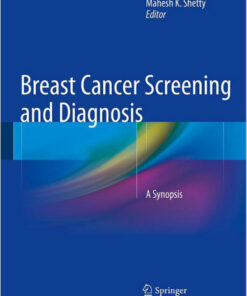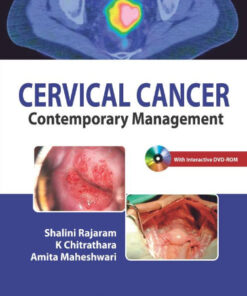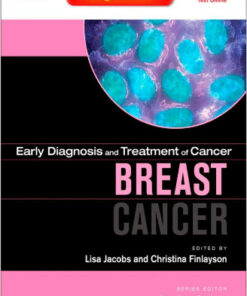GYNECOLOGIC ONCOLOGY
Breast Cancer Screening and Diagnosis: A Synopsis 2015th Edition
GYNECOLOGIC ONCOLOGY
GYNECOLOGIC ONCOLOGY
GYNECOLOGIC ONCOLOGY
Ostergard’s Urogynecology and Pelvic Floor Dysfunction Sixth Edition
GYNECOLOGIC ONCOLOGY
Gynaecologic Cancer: A Handbook for Students and Practitioners 1st Edition
GYNECOLOGIC ONCOLOGY
GYNECOLOGIC ONCOLOGY
GYNECOLOGIC ONCOLOGY
Singer & Monaghan’s Cervical and Lower Genital Tract Precancer: Diagnosis and Treatment 3rd Edition
GYNECOLOGIC ONCOLOGY
GYNECOLOGIC ONCOLOGY
Atlas of Procedures in Gynecologic Oncology, Third Edition 3rd Edition
GYNECOLOGIC ONCOLOGY
GYNECOLOGIC ONCOLOGY
GYNECOLOGIC ONCOLOGY
GYNECOLOGIC ONCOLOGY
Gynecologic Oncology: Clinical Practice and Surgical Atlas 1st Edition
GYNECOLOGIC ONCOLOGY
GYNECOLOGIC ONCOLOGY
Early Diagnosis and Treatment of Cancer Series: Breast Cancer
GYNECOLOGIC ONCOLOGY
Hughes, Mansel & Webster’s Benign Disorders and Diseases of the Breast, 3e 3rd Edition
GYNECOLOGIC ONCOLOGY
Introduction
Gynecologic oncology is a specialized field of medicine that focuses on the diagnosis and treatment of cancers of the female reproductive system. It is important for women to understand the basics of gynecologic oncology so they can make informed decisions about their health care. This article will provide an overview of gynecologic oncology, including what it is, common types of gynecologic cancers, risk factors, symptoms, diagnosis, and treatment options. By understanding gynecologic oncology, women can be better prepared to discuss their health care needs with their doctor.
Overview of Gynecologic Oncology: Types, Symptoms, and Diagnosis
Treatment Options for Gynecologic Cancers
Gynecologic cancers are a group of cancers that affect the female reproductive system. These cancers can be divided into two main categories: cervical cancer and other gynecologic cancers. Treatment options for gynecologic cancers vary depending on the type and stage of the cancer, as well as the patient’s overall health.
Surgery is often the first line of treatment for gynecologic cancers. Depending on the type and stage of the cancer, surgery may involve removing the entire uterus (hysterectomy), part of the uterus (partial hysterectomy), or just the tumor itself (lumpectomy). In some cases, lymph nodes in the area may also need to be removed. Surgery may also be used to remove any metastases (cancer that has spread to other parts of the body).
Radiation therapy is another common treatment option for gynecologic cancers. This involves using high-energy X-rays or other forms of radiation to kill cancer cells. Radiation therapy may be used before or after surgery, or it may be used alone if surgery is not an option.
Chemotherapy is a third treatment option for gynecologic cancers. This involves using drugs to kill cancer cells. Chemotherapy may be used before or after surgery, or it may be used alone if surgery is not an option.
Targeted therapy is a newer form of treatment for gynecologic cancers. This involves using drugs to target specific molecules in cancer cells that help them grow and spread. Targeted therapy may be used in combination with other treatments, such as surgery, radiation, or chemotherapy.
Finally, immunotherapy is another treatment option for gynecologic cancers. This involves using drugs to boost the body’s natural immune system so that it can fight off cancer cells. Immunotherapy may be used in combination with other treatments, such as surgery, radiation, or chemotherapy.
The best treatment option for gynecologic cancers will depend on the type and stage of the cancer, as well as the patient’s overall health. It is important to discuss all available treatment options with your doctor so that you can make an informed decision about which treatment is right for you.
Managing Side Effects of Gynecologic Cancer Treatments
Managing side effects of gynecologic cancer treatments is an important part of the overall treatment plan. Gynecologic cancers, such as cervical, ovarian, uterine, and vaginal cancers, can be treated with surgery, chemotherapy, radiation therapy, or a combination of these treatments. While these treatments can be effective in treating the cancer, they can also cause side effects that can affect a patient’s quality of life.
Common side effects of gynecologic cancer treatments include fatigue, nausea, vomiting, hair loss, pain, and changes in sexual function. Fatigue is one of the most common side effects of cancer treatments and can be managed by getting plenty of rest, eating healthy meals, and avoiding strenuous activities. Nausea and vomiting can be managed with medications prescribed by your doctor. Hair loss is another common side effect of cancer treatments, but it is usually temporary and will grow back once treatment is completed. Pain can be managed with medications, physical therapy, or other treatments prescribed by your doctor. Changes in sexual function can also occur due to cancer treatments, but there are ways to manage this side effect.
It is important to talk to your doctor about any side effects you may be experiencing from your cancer treatments. Your doctor can help you find ways to manage them so that you can continue to live a full and active life. Additionally, there are many support groups available for people who have been affected by gynecologic cancer treatments. These groups can provide emotional support and resources to help you cope with the side effects of your treatments.
Coping with a Diagnosis of Gynecologic Cancer
Coping with a diagnosis of gynecologic cancer can be an overwhelming and frightening experience. It is important to remember that you are not alone in this journey, and there are many resources available to help you cope.
The first step in coping with a diagnosis of gynecologic cancer is to seek out support from family and friends. Having a strong support system can make a huge difference in how you cope with the diagnosis and treatment. Additionally, it is important to find a healthcare team that you trust and feel comfortable talking to about your diagnosis and treatment options.
It is also important to take care of yourself during this time. Eating a healthy diet, exercising regularly, and getting enough sleep can help you manage stress and maintain your overall health. Additionally, it is important to find ways to relax and practice self-care. This could include activities such as yoga, meditation, or journaling.
It is also important to stay informed about your diagnosis and treatment options. Ask your healthcare team questions and research reliable sources of information. Additionally, consider joining a support group for people with gynecologic cancer. This can provide a safe space to talk about your experiences and connect with others who understand what you are going through.
Finally, it is important to remember that everyone copes differently. There is no right or wrong way to cope with a diagnosis of gynecologic cancer. It is important to find what works best for you and to give yourself grace and compassion during this difficult time.
Support Resources for Patients with Gynecologic Cancer
Gynecologic cancer is a type of cancer that affects the female reproductive system. It can be a difficult diagnosis to receive, and it can be overwhelming to think about the treatment options and the potential side effects. Fortunately, there are many support resources available for patients with gynecologic cancer.
One of the most important resources for patients with gynecologic cancer is a support group. Support groups provide an opportunity for patients to connect with others who have gone through similar experiences. They can share their stories, ask questions, and offer advice and support to one another. Many hospitals and cancer centers offer support groups specifically for patients with gynecologic cancer.
Another valuable resource is online support forums. These forums allow patients to connect with other patients from around the world who are dealing with similar issues. Patients can ask questions, share their stories, and get advice from people who understand what they’re going through.
Patients may also find comfort in talking to a counselor or therapist. A mental health professional can help patients process their emotions and cope with the stress of a cancer diagnosis. Counselors can also provide guidance on how to manage the physical and emotional side effects of treatment.
Finally, patients should consider joining a clinical trial. Clinical trials are research studies that test new treatments for cancer. Participating in a clinical trial can give patients access to cutting-edge treatments that may not be available elsewhere.
These are just a few of the many support resources available for patients with gynecologic cancer. With the right support, patients can feel empowered to take control of their health and make informed decisions about their care.
Conclusion
Gynecologic oncology is a specialized field of medicine that focuses on the diagnosis and treatment of cancers of the female reproductive system. It is important for women to understand the basics of gynecologic oncology, including the types of cancer, risk factors, symptoms, and treatments available. By understanding the basics of gynecologic oncology, women can be better informed about their health and make more informed decisions about their care. With early detection and proper treatment, many gynecologic cancers can be successfully treated.


















